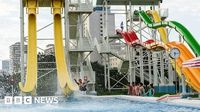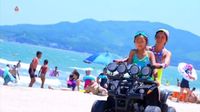North Korea’s ambitious Wonsan-Kalma Coastal Tourist Zone, a sprawling beach resort touted as a landmark project by leader Kim Jong Un, has abruptly halted entry for foreign tourists just weeks after its grand opening to domestic visitors. The announcement, made quietly on the country’s official tourism website, has raised eyebrows internationally, especially following a high-profile visit from Russian Foreign Minister Sergei Lavrov.
Located on North Korea’s eastern coast, the Wonsan-Kalma resort was unveiled with much fanfare in late June 2025 and opened to locals on July 1. State media celebrated the site as a major achievement for the regime, with Kim Jong Un calling it “one of the greatest successes this year” and promising more large-scale tourist developments “in the shortest time possible.” The complex, often dubbed “North Korea’s Waikiki” by South Korean media, features high-rise hotels, luxury villas, an outdoor waterpark, shopping malls, restaurants, and even an airport, sprawling along approximately 4 kilometers (2.5 miles) of beachfront. It is designed to accommodate around 20,000 guests, boasting about 7,000 guest rooms and extensive amenities.
Despite this grand vision, a statement posted during the week of July 14 on DPR Korea Tour, the website managed by North Korea’s National Tourism Administration, declared that “foreign tourists are temporarily not being accepted.” The notice provided no explanation or timeline for when the suspension might be lifted. This sudden reversal came shortly after Lavrov’s visit to the resort during the week of July 7, where he held talks with Kim and Foreign Minister Choe Son Hui. Lavrov praised the development as a “good tourist attraction” and expressed hope it would gain popularity among Russian visitors, especially with the announcement of twice-weekly direct flights between Moscow and Pyongyang set to begin by the end of July.
Russian tourists had reportedly started arriving at the resort around the time of Lavrov’s visit, with a Russian tour guide telling NK News that several trips were planned in the coming months. However, experts suggest that the ban on foreign visitors—including Russians—may be linked to a critical Russian journalist’s report accompanying Lavrov’s trip, which implied that the North Koreans seen at the resort were not genuine tourists but rather mobilized by authorities to create the appearance of activity. Seoul’s Korea Institute for National Unification analyst Oh Gyeong-seob commented, “The North Korean government is believed to have determined that it would face some negative consequences if it opened the site to foreigners.”
Additional analysis from Lee Sang-keun of Seoul’s Institute for National Security Strategy suggests that difficulties in attracting Russian tourists could also be a factor. Many potential visitors might find the resort too remote and the price tag steep. Reports from the BBC and the Russian daily Izvestia indicate that weeklong package tours to Wonsan-Kalma cost between $1,600 and $1,800 per person—a significant expense given that the Russian middle class typically earns between $670 and $2,000 monthly.
Human rights concerns have also shadowed the resort’s construction since it began in 2018. Various groups have protested alleged mistreatment of workers, who reportedly endured long hours under harsh conditions with inadequate compensation. Satellite imagery analyzed by 38 North, a U.S.-based North Korea monitoring site, showed that although the resort appeared “undoubtedly open,” construction was “not quite finished yet” as of mid-July. One of the largest hotels on the site did not seem operational, and Russian media reported on nearly empty beaches contrasting starkly with North Korean promotional images showing staged vacationers.
North Korea’s broader tourism sector has been cautious in reopening after the COVID-19 pandemic. The country permitted Russian tourists to return in 2024 for the first time since the pandemic’s onset, and Western tour operators briefly resumed visits in February 2025. However, international tourism remains limited, with Chinese group tours—once comprising over 90% of foreign visitors—still suspended. In February, a trial program allowing a small group of international tourists to visit the northeastern city of Rason was abruptly halted within a month, signaling persistent challenges in reopening borders fully.
South Korea’s unification ministry has expressed skepticism about the scale of international tourism at the new resort, citing limited flight capacity and logistical hurdles. Analysts warn that the resort’s financial viability depends heavily on foreign currency inflows from Russian and Chinese tourists. Ahn Chan-il, head of the World Institute for North Korean Studies in Seoul, warned, “If foreign tourists aren’t allowed to visit, no Russian rubles, Chinese yuan or U.S. dollars will flow in. Then, North Korea can’t break even and will have to shut down the resort.”
Kim Jong Un’s personal involvement in the project was significant. During construction, he frequently visited the site to oversee progress, underscoring his interest in boosting North Korea’s tourism industry. The resort was intended as a showcase of the regime’s development ambitions and a potential source of much-needed foreign revenue amid ongoing international sanctions and economic isolation.
Yet, the sudden halt on foreign visitors highlights the complex realities facing Pyongyang. Balancing the desire to open up economically with the regime’s strict control over information and movements remains a delicate challenge. The resort’s future depends on whether North Korea can resolve operational issues, address international concerns, and attract the foreign tourists it so desperately needs.
For now, the Wonsan-Kalma Coastal Tourist Zone remains open only to domestic visitors, with state media reporting crowds of North Koreans enjoying the new facilities. Whether the resort will soon welcome foreign tourists as originally planned remains uncertain, leaving the world to watch closely this latest chapter in North Korea’s evolving engagement with the outside world.





